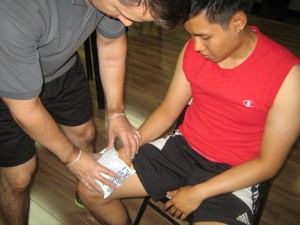Animal bites can scary injuries and can be considered as a medical emergency. The common animal bites are caused by household pets such as dogs and cats. Take note that bites and scratches from cats are prone to infection. As for animal or human bites, they can become infected as well. In such cases, a tetanus shot is needed if the individual has not received one within 10 years, uncertain when the last shot was given and if he/she has been bitten. A tetanus shot must be given within 72 hours after the injury was sustained.
What to do for animal bites
If an individual has been bitten but the bleeding is minor, you have to cleanse and treat the wound just like a minor wound. Cleanse the area thoroughly with water and soap and apply an antibiotic ointment. Using a clean bandage, cover the wound. This will help minimize the risk for infection.
As for bites that creates a deep puncture or the skin is severely torn and bleeding, you have to apply direct pressure to control the bleeding and seek medical assistance right away. If the individual develops fever or other signs of infection such as redness, swelling, pain, foul odor or drainage of pus, a doctor should be consulted.

Danger of rabies
If the animal appears to act strangely and bites the individual, bring him/her to the emergency department since the animal might have rabies. This is true if the bite was delivered by skunks, bats, foxes and raccoons.
If possible, the animal should be captured as long as it is safe so that it will be checked for rabies which is a condition that can be deadly to humans if not treated. In case the animal is dead, use gloves to move it into a plastic bag. Remember not to damage the head of the animal since rabies testing is done on the brain. Clean the area and any tools used in removing the animal with bleach solution.
Strange behavior among animals can indicate rabies and usually includes an unprovoked attack. Rabies is rare in cats, dogs, rodents and plant-eating animals. Other indications that an animal has rabies include drooling, running around in circles, paralyzed appearance and displaying unusual or aggressive behavior.
Preventive measures
The ideal way to prevent children from getting animal bites incudes those who might have rabies involves observing several measures which includes the following:
- Instruct children to avoid unfamiliar animals especially those in the wild and understand that any animal might bite when frightened, injured or sick. Even pets that are normally friendly can bite if they are surprised by abrupt motions or noises or disturbed when eating or sleeping.
- Make sure that your child had a tetanus shot
- Do not leave young children unattended with animals
